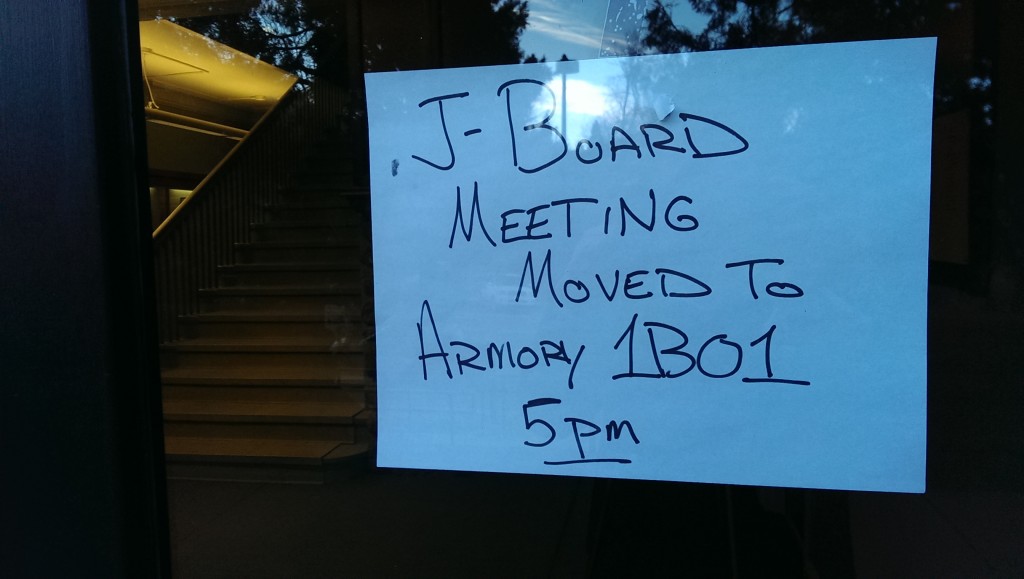Executive officers of the journalism school’s student government introduced a set of new bylaws that would give the journalism student body newfound voting power.
Journalism Board read through an eight-page set of proposed bylaws during a meeting on Thursday, Feb. 20 that would allow students to elect the school’s representatives and candidates for executive officers.
J-Board continues to operate without bylaws since it suspended them all in December, relinquishing students outside of the nine executive board members of the ability to vote.
The proposal considered this week would replace 13-year-old bylaws and establish order within the student group that has been reorganizing alongside the school itself.
Andrew Haubner, J-Board president, said he wrote the new bylaws between Sunday and Wednesday. He drew largely on the University of Colorado Engineering Council and Leeds (School of Business) Council bylaws to expand J-Board’s suspended bylaws.
A vote of the student body would decide candidates to the executive board under the proposed bylaws, but students’ ability to vote in an election of candidates is unclear. Under Article IV, the proposal states that “Candidates will be elected by popular vote,” but also that “Students are eligible to vote for the executive officer.”
Old bylaws defined the representative position as a one-person job, but Thursday’s proposal calls for two co-senators to serve as journalism representatives on CU Student Government. Both would be popularly elected.
Haubner said the board will discuss on Sunday voting procedures for executive board candidates and co-senators, but specifics are likely to not yet appear in the bylaws.
“Because the voting is essentially done for this semester, it’s not something that I felt necessary to put in at this very moment,” Haubner said. “I’m still gonna be president through the spring and into the fall, so there will be a change done there.”
Haubner said he would model the journalism or future media school’s student body elections on the Engineering Council’s procedure, which includes a voting station in the school’s main lobby that’s open for at least two school days.
The proposal does specify votes that are reserved to the J-Board, which include funds or budgets of the school, may be conducted by the president via email “should the voting matter be time or content sensitive.”
Email voting was borrowed from Leeds Council’s voting policy. The definition of a “content sensitive” matter receives no definition in either Leeds’ or the J-Board’s proposed bylaws.
The proposed bylaws also give J-Board the ability to change meeting times throughout the semester, and state that all members of the student body will be notified if a change occurs. On Thursday, notification of a change to the meeting room appeared in the form of paper signs taped in the front entryway to the Armory.

Board members are allowed to vote only if they are present at meetings in the proposed bylaws. Members of CU Student Government, Leeds Council and Engineering Council are allowed to send a stand-in, called a proxy, who is allowed to vote for the member.
“I don’t like the idea of proxy voting,” Haubner said. He asked that anyone who disagreed prepare an amendment to allow proxy voting.
The board may dismiss any members from J-Board if a vote of confidence receives three-quarters of the board’s approval in the proposed bylaws. Haubner said Minor in Possession tickets are included in his definition of grounds for removal.
An entirely new article, regarding societies and standing commissions, was added to the old J-Board bylaws in the proposal. Article VII is a simplified version of the Engineering Council’s Article III, which allows student groups to receive funding from the board if they remain in good standing.
Another new article designates the school director as the J-Board’s official adviser.
Haubner said he consulted Christopher Braider, the director of Journalism and Mass Communication, before he added the stipulation. On Wednesday, the day before the proposal meeting, Braider told CU Independent that he was not an adviser to the board and that David Martinez, a faculty member overseeing the school’s diversity programs, is the current adviser.
The proposal also changes the student government’s name from Journalism Board to Student Board.
J-Board will consider amendments and take a final vote on the proposed bylaws beginning 3 p.m. Sunday in Armory Room 1B01.
Contact CU Independent Breaking News Editor Alison Noon at alison.noon@colorado.edu.
 CU Independent University of Colorado Daily Student News
CU Independent University of Colorado Daily Student News
